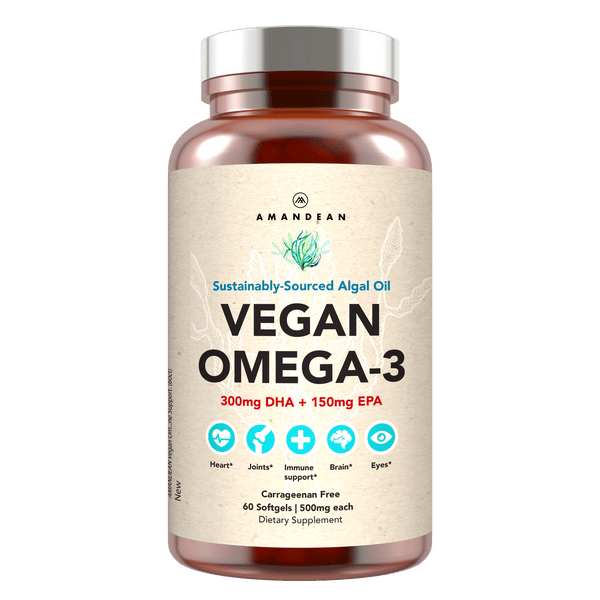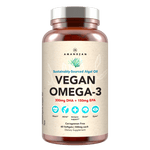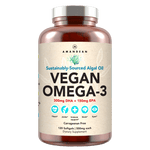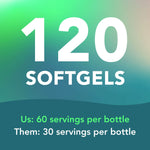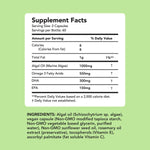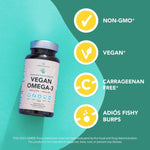Your Cart is Empty
The Top Benefits Of Taking Collagen Daily
Key Takeaways Glow from Within: Daily collagen supplementation may help support skin hydration, elasticity, and visible radiance while offering potential...
You care about what goes in your body—and what doesn’t. Whether you’re plant-powered by choice, lifestyle, or a deep love for animals and the planet, Vegan Omega-3 is one supplement you shouldn’t be skipping, especially in a clean, high-performance formula from Amandean.



Vegan Omega-3 supplements are often made from seed oils rich in ALA (alpha-linolenic acid), a precursor to EPA and DHA – but one that the body converts inefficiently. What sets our formula apart is that it provides both DHA and EPA directly, without relying on that limited conversion process. By sourcing our omega-3s from algae – the original marine source – we deliver the crucial fatty acids your body needs, fully bioavailable and completely plant-based.
Most people are familiar with omega-3s from fish, but the truth is, not everyone eats fish, and some prefer plant-based options. Whether you follow a vegan lifestyle, have dietary restrictions, or simply want to avoid fish-based products, vegan omega-3s provide an excellent alternative. The beauty of plant-based omega-3 is that it gives you all the heart, brain, and joint health benefits without any fishy aftertaste or burps.
While many vegan omega-3 supplements derived from algal oil only contain DHA, our formula includes both DHA and EPA – the two essential omega-3 fatty acids your body relies on. It also contains a small amount of DPA, another beneficial fatty acid, though it’s not listed on the label since it's not currently standardized like DHA and EPA. This makes our product a more complete and effective plant-based omega-3 option.
Choosing the right omega-3 supplement can feel overwhelming, especially when you’re deciding between traditional fish oil and vegan omega-3. Each option claims to support your health similarly, but some key distinctions are worth exploring. Let’s break down the differences and clear up the confusion.
Fish oil has long led the omega-3 market because fatty fish like salmon and mackerel are rich in EPA and DHA – two essential fats your body doesn’t produce efficiently. But fish get these omega-3s from marine algae, not from making them themselves.
According to a study in the journal Lipids, over 90% of Americans don’t get the recommended 500 mg/day of EPA and DHA from diet alone, making supplementation a practical way to close the gap.
Some vegan omega-3 supplements cut out the fish and source their omega-3s from algae—but not all are created equal. Most provide only DHA, not EPA. Our formula uses a specific algae strain that delivers both DHA and EPA directly, offering the full spectrum of benefits without relying on fish or risking exposure to ocean-borne contaminants.
Purity isn't just about heavy metals – oxidation is a major concern with fish oil supplements. When oils oxidize, they turn rancid, which can compromise efficacy and trigger digestive issues. This is especially common in flavored formulas designed to mask the fishy smell. That’s why TOTOX (Total Oxidation) testing is critical. Amandean tests every batch to ensure freshness and stability.
Not all algae-derived omega-3s are created equal. Many are grown in open-air vats overseas, where exposure to environmental toxins is harder to control. Ours is different. We use algae grown in the USA by DSM – a trusted, high-standard supplier – in a fully closed and controlled, indoor system. It’s processed on-site and sealed under nitrogen immediately to preserve purity and prevent oxidation.
Every batch is third-party lab tested to confirm purity, potency, and freshness – so what’s on the label is exactly what you get, every time.
Demand for fish oil has environmental consequences. Overfishing threatens marine biodiversity and impacts the food web and ocean ecosystems. Algae-based omega-3 is a more sustainable choice that sidesteps the challenges of overfishing and supports a lighter ecological footprint.
Algal cultivation requires fewer resources and causes less environmental disruption, making vegan omega-3 a compelling option for those who value planetary health as much as their own.
Omega-3 fatty acids are essential building blocks for a thriving, healthy body. Traditionally found in fish oil, these beneficial fats can now be sourced from algae, making them accessible for everyone, including those embracing a plant-based lifestyle. But why should you consider adding vegan Omega-3 to your daily routine? Let’s take a closer look at the potential upsides.
Numerous studies suggest that omega-3s can be key to supporting cardiovascular wellness.¹ Regular intake of these fatty acids may help maintain healthy cholesterol levels and support optimal blood pressure. Vegan omega-3 derived from algae delivers a clean, eco-friendly solution for those seeking a heart-healthy supplement without compromising plant-based values.
Your brain thrives on good fats. Omega-3s are integral to brain cell membranes and are crucial to cognitive processes. Supplementing with vegan omega-3 may help sharpen focus, support memory retention, and encourage overall mental clarity, making it a brain-friendly addition to your wellness toolkit.
DHA, a type of Omega-3, is heavily concentrated in the retina. Studies suggest maintaining adequate levels of these vital fats could support long-term eye health and visual acuity.² For those who spend hours in front of screens, vegan Omega-3 offers a simple way to help safeguard your sight.
Our bodies encounter daily stressors that can lead to inflammation, sometimes holding us back from feeling our best. Omega-3s have shown promise in managing inflammation, which may promote joint comfort and aid in post-workout recovery. Incorporating vegan Omega-3s into your routine could be essential to a more balanced, comfortable lifestyle.
Beyond the individual health perks, vegan omega-3 stands out for its minimal environmental impact. Sourced from algae and not reliant on fish, this supplement supports ocean sustainability, helping you look after your health while caring for the planet.
If you believe a well-rounded wellness routine shouldn’t have to compromise your values, vegan omega-3 could be your next essential daily addition. But who benefits most from these plant-based fatty acids, and are there times when upping your intake is non-negotiable? Let’s break it down and see who should be paying special attention.
For those who prioritize their health and planetary well-being, vegan omega-3 is an obvious choice. Fish-based supplements have long been the go-to, but the tides are turning: plant-based eaters, eco-minded consumers, and anyone curious about sustainable living can harness the power of algal oil—the original, clean source of DHA and EPA, directly from the ocean’s original omega-3 factory.
Plant-based diets are recognized for their diversity and health potential, but omega-3s are difficult to source in purely vegetarian or vegan meal plans. While flaxseeds and walnuts provide ALA (a precursor omega-3), direct sources of DHA and EPA are rare without marine foods. For the strictly plant-powered, a vegan omega-3 supplement is often the bridge to filling this nutritional gap, transforming potential deficiency into proactive well-being.
Omega-3s are critical in cognitive and visual development, especially during pregnancy and early childhood.³ Many experts recommend omega-3 supplementation for women who are pregnant or breastfeeding, but traditional fish oil is off the table for vegan or vegetarian families. Here’s where vegan omega-3 becomes more than a lifestyle preference—it’s an essential.
Some moments in life demand a second look at nutrition. If you fall into any of the categories below, making vegan omega-3 a daily habit isn’t just smart—it’s vital:
For these pivotal times, prioritizing omega-3s from a trustworthy, plant-based source is a small step that offers outsized rewards.
Adding Vegan Omega-3 into your daily routine is easier than you think. Whether you’re a busy professional, a wellness beginner, or someone looking for a simple daily upgrade, our vegan omega-3 softgels make it easy to get the benefits – no measuring, mixing, or recipes required.
Incorporating Vegan Omega-3 into your diet isn’t just about the nutritional benefits—it’s about aligning your wellbeing with your values. By choosing plant-based sources, you’re supporting a lifestyle that’s as good for the planet as it is for you. Set yourself up for success by keeping your omega-3 supplement visible, tracking your intake with wellness apps, and sharing tips with your community.
If you’re considering making Amandean’s Vegan Omega-3 part of your daily routine, you’re in for a clean, effective, and science-backed supplement that checks every box—from high-quality ingredients to real results. Here’s what you need to know about what’s inside and how to get the most from each dose.
Each serving (2 softgel capsules) contains 1,000mg of algal oil sourced from Schizochytrium sp., a sustainable marine algae. That delivers 550mg of total Omega-3s, including 300mg DHA and 150mg EPA – two essential long-chain fatty acids that support brain, heart, and joint health. There’s even a trace of DPA in every serving, but because it's not yet standardized, we leave it off the label – unlike some brands that list it for marketing points.
This direct source of DHA and EPA is far more effective than plant-based ALA (from chia or flax), which the body must inefficiently convert.
Amandean’s formula is:
The softgel capsules are made from non-GMO tapioca starch.
Taking it with food improves absorption, especially of fat-soluble nutrients like DHA and EPA.
This formula is generally well tolerated, but always consult your healthcare provider if you are:
Stop use immediately if you notice any side effects, and always keep supplements out of reach of children.
Amandean’s Vegan Omega-3 delivers real results from a clean source. With its balanced DHA/EPA ratio and ultra-pure algal oil, it’s built for people who want powerful omega-3 benefits, without the fish.
Read also:
Sources:
A traditional plant-based diet can be a little tricky when it comes to omega-3s. While you’ll find ALA (alpha-linolenic acid) in foods like flaxseeds, chia, and walnuts, your body has to convert that ALA into the more powerful forms, DHA and EPA—which isn’t super efficient. That’s why adding a vegan omega-3 supplement, especially one derived from algae, helps ensure you’re getting optimal levels without compromise.
Start by making sure it contains both DHA and EPA – many only include DHA, which limits the benefit. Check that it’s made from algae grown in the USA, not overseas in open vats. The softgels should be carrageenan-free, and the product should be manufactured in a GMP-certified facility. Most importantly, look for third-party lab testing that verifies active ingredients, screens for heavy metals and microbes, and includes TOTOX scores to ensure freshness.
Yes! Algal oil isn’t just a stand-in—it’s one of the most efficient and sustainable sources of both DHA and EPA, the very same omega-3s found in fish, but without the environmental and ethical drawbacks. With the right dosage and an otherwise balanced diet, algae-based omega-3 may fully support your nutritional requirements.
Vegan omega-3 supplements are generally well-tolerated, especially when derived from high-quality algal oil. Some people might experience minor digestive upset, but this is rare and often temporary. As with any supplement, it’s always smart to start with the recommended dose and consult your healthcare provider if you have concerns.
Yes. The secret is in the source—fish get their omega-3s from eating algae, so by going straight to the original source, vegan omega-3 delivers the same key benefits for brain, heart, and joint health, just without the fishy aftertaste or environmental impact.
High-quality vegan omega-3 supplements like Amandean’s are formulated to be allergen-free: no fish, shellfish, soy, or gluten involved. Always check product labels for specific allergen information, but rest assured, our commitment to pure, premium wellness means you can supplement with confidence.
